- Home
- Robin Hobb
The Inheritance and Other Stories Page 15
The Inheritance and Other Stories Read online
Page 15
More conversationally, she added, “You know what really pisses me off? That Carl gave them my bike and some money for picking up his dope. He never gives me nothing for picking up his junk. I just have to do it. So that if someone gets caught with it, it’s me. He told my mom, if I get caught, they won’t do much, because I’m a kid.”
“But doesn’t your mom . . .” I began.
“Long as my mom gets her junk, she’ll believe whatever he says,” Lonnie said sadly. “Since Carl moved in, it’s like I’m mostly invisible. She doesn’t even yell at me anymore. The only time she talks to me is when I bring the junk home. She always thanks me. That’s the only reason I do it.” Her eyes swung to mine. “And I still talk to her. Carl’s always telling me to shut up, but I don’t. I tell her about my cats, I told her about you.” In a quieter voice she added, “I tell her she shouldn’t be tricking just to get money for junk. That’s how I fight him. Maybe I won’t win, but no one can say I didn’t fight.” She gave her one-shouldered shrug. “I won’t stop, either. Long as I keep fighting, he can’t say he won.”
When I got in, Mom was waiting for me. Her face was white. “I damn near called the cops,” she hissed at me. “You didn’t call me; I came straight home, there’s no sign of you . . .” Then she burst into tears.
I was stupid. I told her where I’d been and what had happened. When I was done, she just sat there on the couch with her face in her hands. She spoke through her fingers. “God, Mandy. You have no concept . . . look. Sweetie. You can’t get involved in this. You just can’t. Drugs and prostitution and abuse and . . . No. Mandy, you have to stay away from her. You must.”
“I can’t.” I was telling the truth. “I can’t just abandon her. Then she’d have no one! I have you, but she doesn’t have anyone but a bunch of stray cats.”
Mom got up and walked into her room without a word. That really shook me up. For a minute I thought that was it, that she was so mad she wasn’t even going to talk to me anymore. Then she came back with a little red tube in her hand.
“This is not a toy,” she told me severely, as if I had asked to play with it. “This is a serious weapon. Pepper spray. You point it like this, push this catch down, and then spray it. It will make anyone back off long enough for you to run away. Don’t stick around and try to fight, just get away. And use it only if you are really in danger. Never for a joke, never as a threat. If you have to, use it. Other than that, don’t even tell anyone you have it.”
“There’s two,” I said out loud as I took them.
“Give the other one to Lonnie,” she said. She walked to the window and peered out through the curtains. She talked to the night. “Show her how to use it. But after that, you are not allowed to see her anymore. Do you understand? This is as much as we can do for her. No more.”
I couldn’t argue with that voice, but I wondered if I would obey her. “Mom,” I asked quietly, “if you had been there tonight, if you had been me . . . would you have used it on those boys?”
“No. Boys your age are just . . . Well, maybe, yes. Yes.” She hesitated. “I don’t know,” she admitted. “Mandy, I don’t know; I wasn’t there, and you weren’t the one being threatened . . . If Lonnie had just walked away, if she hadn’t challenged them . . .” Her voice trailed away. She didn’t know either. How could I know when to fight back if my own mom didn’t know? In a quieter voice she added, “I have to get us into a better place. I have to.”
I didn’t see Lonnie for a while. I took a different route home from school, used a different door into my building. I pretended that if I didn’t see her, I wasn’t avoiding her. I liked her, but her problems were just too scary. I tried not to think about her, but my hand kept finding the extra vial of pepper spray in my coat pocket. Then one afternoon at four o’clock, I turned off the TV and put on my coat. I wrote Mom a note. I left the apartment.
It was dark but at least it wasn’t raining. I walked fast, glad there were no boys hanging out around her building tonight. I wondered how I’d know which door was hers. I wondered if I’d have the guts to knock. But I didn’t have to. Lonnie knelt on the ground by the Dumpster. The single parking lot light illuminated at least a dozen orange outlines of cats on the pavement. As I watched, another one slowly formed on the ground in front of Lonnie. I went to her.
The area around the Dumpster was littered with sprawled cat bodies. A terrible noise was coming from Lonnie as she painted around them. Uh, huh, huh. The noise people make when they can’t cry. I was afraid to get too close to her. She crawled to the next cat and began outlining it.
“What happened?” I whispered into the darkness.
She looked up, startled. Even in the dimness, I could see she was broken. “I don’t know,” she choked out when she recognized me. “I don’t know. They weren’t hit by cars, they weren’t killed by dogs. They’re just dead. I just don’t know.” She sank down in defeat on the dirty pavement. “My strays. My loyal subjects.” Her hand rested on one dead cat like a benediction. Behind her, a small kitten mewed questioningly in the bushes. “I got nothing left,” she told me sadly. She shook her head. “I fought and I fought. But I still lost. In the end, it all got taken away.” She seemed to get smaller.
“Lonnie!” Carl called from the window. He leaned out, craning to see her. “Lonnie, you down there? You got my stuff?”
It was the wrong time to ask her that. She came to her feet like a puppet hauled up on its strings. “No!” she screeched back. “No, I don’t!” Then, in a plea for understanding, “Carl, my cats are dead! Something killed them.” Her voice broke on the words.
“Oh, no, really?” His voice shook. “That’s awful, Lonnie. That’s just terrible.” Then he laughed out loud, and I knew he’d been holding it back all along. “Well, maybe someone poisoned the fuckers so you’d quit wasting time on them. Quit sniveling and go get my stuff. Now!”
Her hands flew up to her face in horror. Speechless, she stared into the darkness beyond the Dumpsters. When she dropped her hands a moment later, her painty fingers had left fluorescent tabby-cat stripes on both her cheeks.
I couldn’t believe what happened next. She didn’t even look at me. She limped straight to the door of her building. She obediently went inside. Lonnie had stopped fighting.
The kitten found me. I felt her tiny claws in my sock. I picked her up. She was skinny and her little mouth opened hugely when she cried. “You’ve got the wrong person,” I told her. I set her down and walked away.
Then I heard the sound. Not a shout. A roar, like the roar of a lioness, wordless in her fury. It came from the window above. Carl yelled back but it was a startled shout, full of dismay. I couldn’t see much, but I saw her shadow crash into his, her fists pummeling at his face and chest. For an instant I thought that she could win. But it was still a boy’s game. I heard his answering roar of anger. He seized her by the upper arms, lifted her off her feet, and threw her.
She hit the window. The glass shattered, flying out like a cloud of diamonds. Lonnie fell with it, twisting and yowling.
I did a stupid thing. Somehow I had the pepper spray in my hand and I pointed it up at the window. Lonnie seemed to be falling forever. I saw Carl look out as she fell; I even saw the shock on his face, heard someone else in the room behind him scream.
Then I squeezed the button and enveloped myself in a cloud of pepper gas. Carl was too far away. Even finally knowing when to fight, I thought to myself, was not enough. People like Carl still won. Blinded and choking, I fell to my knees as Lonnie struck the ground. Broken glass rang in a brittle rain with her.
Everything in the world stopped. I didn’t kneel by her, I crumpled. I tried to touch her but I couldn’t. I wasn’t Lonnie, to touch death without fear. Then she lifted her head. She looked at me and her mouth opened. As if she moved a mountain, she turned her head. Her lips pulled back. With her last breath, she lifted her upper lip and snarled up at the window that framed Carl.
Summoned, the cats came. The queen’
s loyal subjects poured forth to her call. Without a rustle of leaves, without a patter of paws, they came. Orange shapes flickered in the night. They came in a wave that became a tide. From the bushes in back of the Dumpster, from under cars, from the distant streets, from everywhere, they came. They flooded the parking lot. A score, a hundred, five hundred fluorescent orange silhouettes lit the night as they answered her call. I saw Carl stagger back from the window. Like living flames, the cats licked up the side of the building, over the sill, and through the broken glass. The rumble of their snarls were like a big truck idling. The parking lot was darker when the last one disappeared inside. The hissing and spitting and caterwauling from up there almost drowned his screams.
Mom’s headlights hit me just about the same time the cats poured out of the window again. Like molten gold or streaming honey, they flowed down the side of the building. They engulfed Lonnie and me. I felt the warmth of a hundred small bodies, the soft swipe of velvet paws as they rushed past and over me to get to her. I swear I saw them, and I swear I felt them.
They purred all over Lonnie, they marked her with their brows, they bumped her with their fluorescent noses. They nudged and they pleaded and they nagged, pushing at her body. They kneaded it with their paws demandingly, scores of little fluorescent paws pushing at her yielding flesh, making her smaller and more compact, re-creating her in a new and perfect image.
The Queen of the Strays sat up groggily. She blinked her great amber eyes. She lifted a velvet paw to swipe at her tabby face. She stood and she stretched, showing me four sets of razor claws and four powerful legs attached to a lithe and perfect body.
“Lonnie?” I asked incredulously.
The cat shrugged one shoulder.
In the next instant, Lonnie was gone. The tidal wave of fluorescent cats retreated, and she padded off in the midst of them. The great orange glow surged into the blackberry tangle. Their light dwindled as they faded into the thorny jungle of vines. Then it winked out. Lonnie was gone and my mom was there going, “Oh, my God, my God. Get in the car, Mandy. Right now. Get in the car.”
I did. We were halfway home before I noticed the tiny black-and-white kitten that was stuck to my sock like a burr. When I put it in my lap, it curled up and began to purr.
I don’t know what Mom saw that night. She says I had pepper gas in my eyes and that I couldn’t have seen anything. The papers said that a junkie whore got mad at her pimp and cut him to ribbons with a razor. The papers never even mentioned Lonnie.
No one ever wonders what happens to strays when they disappear.
I hope her next eight lives are better than this one was.
Finis
Sometimes it seems to me that the public appetite for certain types of stories comes and goes in waves. It’s most visible, I think, on television. There is a decade of westerns, a decade of doctor shows, followed by a decade of forensic scientists or vampires or rich teenager tales.
Similar waves rise and fall in our genres. Steampunk gives way to urban fantasy. Psychic romance alternates with alternate history. Of course, our genre is probably the only place where we feel free to mix tropes and trends freely. I am sure that an urban steampunk fantasy that involved a psychic tracking down lost lovers in an alternate history setting could do quite well. One could even toss in a werewolf and an alien, and many readers would not find the mixture too heady.
For me, the most fun of working with an overworked topic is trying to burnish away the barnacles and rust to find the solid true core of story at the middle. When anything becomes a stereotype or a cliché, there is one sure truth about it: at the core of it, there is something vital, something that speaks so strongly to all of us that we return, over and over, to try to grasp completely the lesson it is trying to teach us.
This is my effort to knock some of the rust off a cliché and look at it from a slightly different perspective.
Josh was working with a hammer and chisel, cutting out just enough wood from the oak posts to make the gate hinges set flush when the rental sedan came inching slowly up the drive. Its tires crunched softly over the gravel; other than that, it was near silent, the driver letting the car almost idle up the lane. Arizona plates. Well, someone had driven a long ways to visit Mrs. Reid. Josh watched it for a moment, then went back to his work. Her guest was none of his beeswax; the visitor would be for the home owner, not him. He was just the handyman, finishing up the final work on her yard project, just as he was the handyman for a couple dozen other owners of rural cottages.
But of them all, Mrs. Reid was the oddest. Strange lady. The little cottage at the end of the winding lane looked almost exactly as it had when she’d bought it. Usually, when some rich lady bought up one of the cottages, the first thing they did was gingerbread it up. Fresh paint, a patio, a hot tub, and a privacy fence. Those were the standard changes he made for new clients. But not Mrs. Reid. He picked up a Yankee screwdriver, inserted a small bit, and jacked two pilot holes into the post. The only real changes she’d wanted him to make were out here in the yard. But that was none of his beeswax either. The customer got to say what she wanted done and how she wanted it done. No matter how strange the requests. He wiped sweat from his forehead with the back of his cuff and then tried the hinge in its place. Perfect. He’d have it done by dark.
He was reaching for the screws and screwdriver when the man spoke behind him, startling him. “I’m looking for a woman named Doria. She goes by Doria Simmons. Does she live here?” He had a deep voice, and the softness of his words seemed intentional. The slight sibilance sounded like bad-fitting dentures.
Josh turned to look up at him. The short, stocky man standing over him had gotten out of his car quietly, not even shutting the door behind him. He was an old man, at least in his seventies and more likely in his eighties. The coarse curls of his hair had gone to gray, and there were deep furrows in his brow. A small silver cross on a silver chain rested snugly at the hollow of his throat. It looked odd on a man of his size and years. He lugged a heavy canvas satchel like a workman’s tool bag, but he didn’t have the physique of a man who worked with tools anymore. His shoulders were rounded, curling in toward his chest, and the veins and tendons stood out beneath the age spots on his hands. He just looked old, old and tired. But he also looked determined, in a mean old man sort of way that put Josh’s hackles up without him even thinking about it.
Josh shook his head. “No sir. This is Mrs. Agatha Reid’s cottage. She only moved in a couple months ago. Maybe someone named Simmons lived here before. I wouldn’t know. People who buy these little cottages off the beaten track usually like to keep to themselves. It’s not my place to ask a lot of questions, you know. I’m just the handyman.”
The man’s eyes had narrowed at the woman’s name, a wince almost of pain. It deepened the lines around his mouth and the ones in his brow. “Reid? She’s using the name Reid?”
“That’s the lady that lives here, yes sir. I don’t know about her ‘using’ that name. It’s the only name I know her by.” Josh positioned the hinge, licked the point of the screw, set the point of it into the pilot hole, and then pushed it in with the screwdriver. He leaned against it, pushing hard as the screw bit into the wood. Josh had expected the man to leave. Instead, he stepped closer.
“The woman I’m looking for used to be married to a man named Reid. Adam Reid. She might still be using his name.”
“Well, she told me she was widowed. So Reid might have been her married name. She never told me her husband’s name. I think it still makes her sad to talk about him.” He positioned another screw and began working it in.
The man didn’t reply directly to that. Instead, he leaned over Josh in a way that the handyman resented. He hated working under someone’s scrutiny. That had been one pleasant thing about his job. Mrs. Reid slept days and worked nights. He’d only seen her when she’d given him the carefully written directions for what she wanted done, and the times when she’d given him money for his work and to buy materia
ls. Nice working for a person who didn’t ride him all the time. Even nicer working for someone who paid cash up front.
Now the old man spoke his opinion. “That’s a pretty fancy gate you’re putting up there. Lots of ornamental crosses in the ironwork. But what’s that shiny stuff threaded all through the scrollwork?”
“Lady wanted it done that way. Mrs. Reid wanted all the iron pickets topped with crosses, and the gate to match.” Josh answered reluctantly. It wasn’t good business to talk about his customer’s foibles. Folks who moved this far away from even a little town like McKenna usually valued their privacy. And he valued their business. There wasn’t much else going in McKenna for a jack-of-all-trades.
“That wire looks like it’s real silver.” The old man leaned closer, peering at the wire without touching it. Then he turned his head slowly, following the gleam of the silver wire as it snaked the full length of the fence. It was real silver wire, ordered through the jeweler in town. Mrs. Reid had told Josh to run it in and out of the close-set pickets for the full perimeter of the fence. He’d thought it a terrible waste of her money and told her so. He’d warned her that someone might just see and decide to help themselves to it. She’d insisted, and the customer was always right. He’d done as she’d asked. He just hoped that it would make the young woman feel a bit safer. She was a pale, sickly sort to begin with, and her eyes were all full of sorrow, as if she were pining away.
“And is that garlic planted all along the fence?”
“Yes sir.” Josh was feeling more than a bit irritated and less inclined to talk by the minute. He’d promised Mrs. Reid that the gate would be ready by tonight. She’d been looking forward to the completion of this project for weeks. A substantial bonus was riding on it, and this fellow was delaying him.
Now the man had stepped back to regard all of Josh’s careful handiwork. As the old man’s gaze traveled along the fence, his hand touched the silver cross at his throat. “Crosses worked into the ironwork of the gates, and each wooden picket is a cross at the top. And Saint-John’s-wort and wolfsbane planted all along the outside of the fence.”

 Ship of Destiny
Ship of Destiny Golden Fool
Golden Fool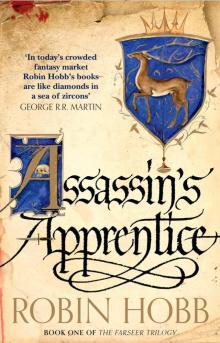 Assassins Apprentice
Assassins Apprentice The Dragon Keeper
The Dragon Keeper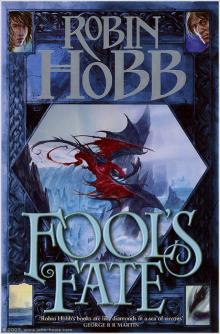 Fools Fate
Fools Fate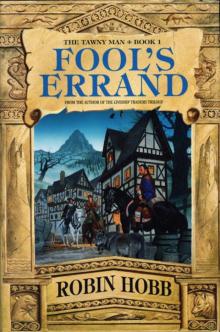 Fools Errand
Fools Errand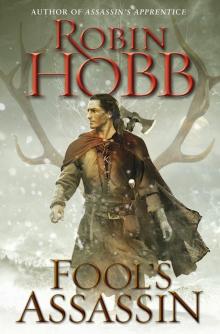 Fools Assassin
Fools Assassin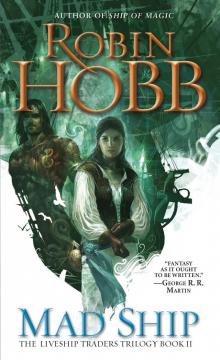 The Mad Ship
The Mad Ship Shamans Crossing
Shamans Crossing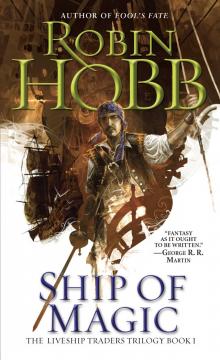 Ship of Magic
Ship of Magic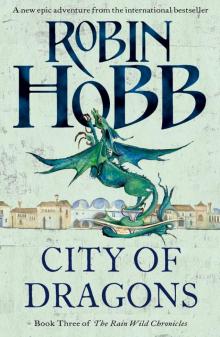 City of Dragons
City of Dragons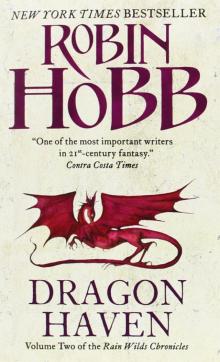 Dragon Haven
Dragon Haven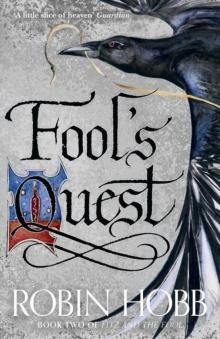 Fools Quest
Fools Quest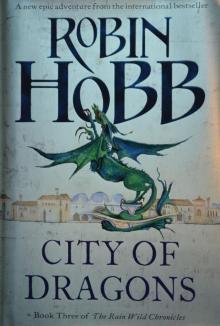 Blood of Dragons
Blood of Dragons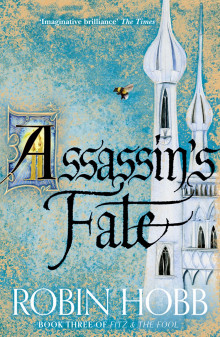 Assassin's Fate
Assassin's Fate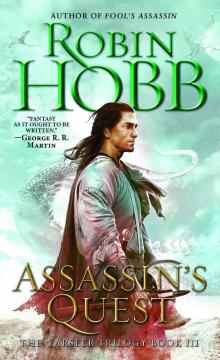 Assassins Quest
Assassins Quest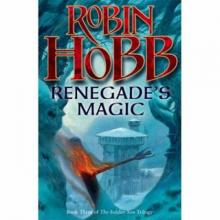 Renegades Magic
Renegades Magic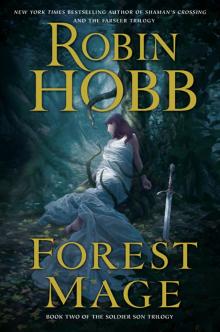 Forest Mage
Forest Mage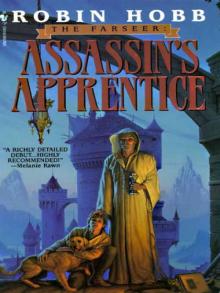 Assassin's Apprentice tft-1
Assassin's Apprentice tft-1 Assassin's Quest tft-3
Assassin's Quest tft-3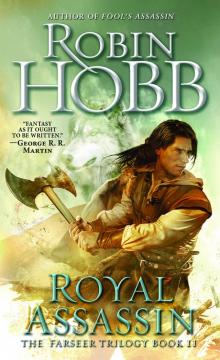 Royal Assassin
Royal Assassin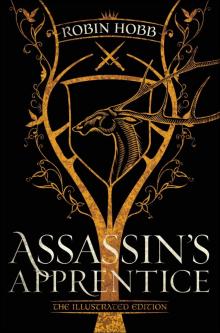 Assassin's Apprentice (The Illustrated Edition)
Assassin's Apprentice (The Illustrated Edition) Assassin's Quest (UK)
Assassin's Quest (UK) Royal Assassin (UK)
Royal Assassin (UK)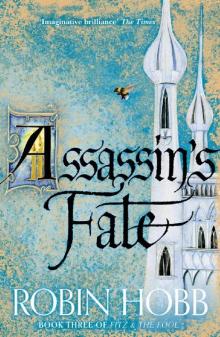 FF3 Assassin’s Fate
FF3 Assassin’s Fate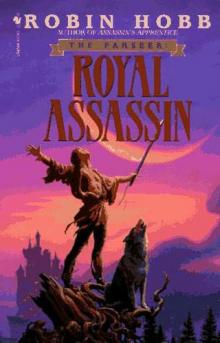 Royal Assassin tft-2
Royal Assassin tft-2 Fool’s Assassin: Book One of the Fitz and the Fool Trilogy
Fool’s Assassin: Book One of the Fitz and the Fool Trilogy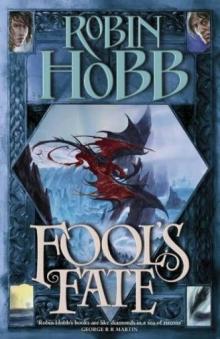 Fool's Fate ttm-3
Fool's Fate ttm-3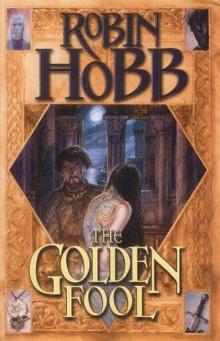 The Golden Fool ttm-2
The Golden Fool ttm-2 The Liveship Traders Series
The Liveship Traders Series The Wilful Princess and the Piebald Prince
The Wilful Princess and the Piebald Prince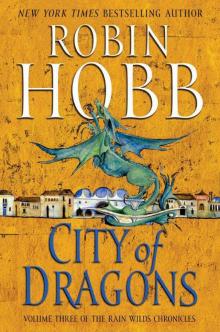 City of Dragons rwc-3
City of Dragons rwc-3 The Tawny Man 1 - Fool's Errand
The Tawny Man 1 - Fool's Errand Words Like Coins
Words Like Coins The Complete Tawny Man Trilogy Omnibus
The Complete Tawny Man Trilogy Omnibus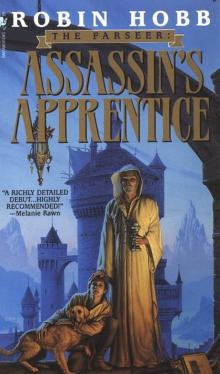 Farseer 1 - Assassin's Apprentice
Farseer 1 - Assassin's Apprentice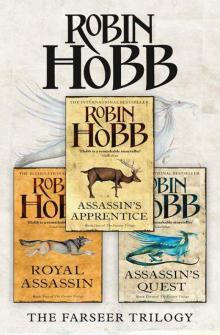 The Complete Farseer Trilogy Omnibus
The Complete Farseer Trilogy Omnibus The Soldier Son Trilogy Bundle
The Soldier Son Trilogy Bundle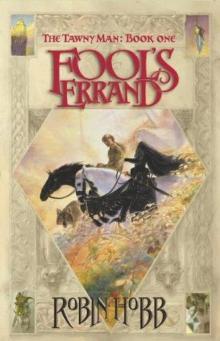 Fool's Errand ttm-1
Fool's Errand ttm-1 Blue Boots
Blue Boots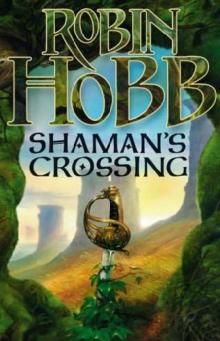 Shaman's Crossing ss-1
Shaman's Crossing ss-1 Mad Ship
Mad Ship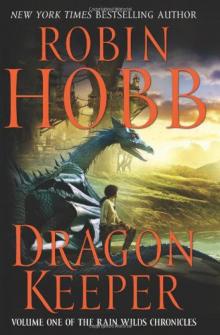 Dragon Keeper
Dragon Keeper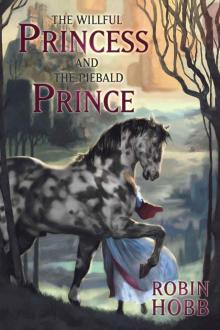 The Willful Princess and the Piebald Prince
The Willful Princess and the Piebald Prince Ship of Destiny tlt-3
Ship of Destiny tlt-3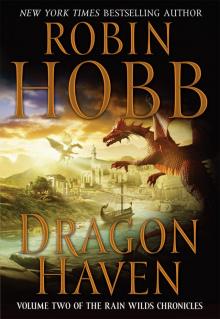 Rain Wild Chronicles 02 - Dragon Haven
Rain Wild Chronicles 02 - Dragon Haven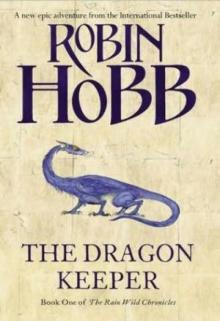 The Dragon Keeper trwc-1
The Dragon Keeper trwc-1 The Triumph
The Triumph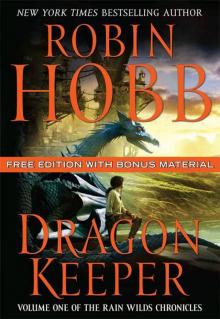 Dragon Keeper Free Edition with Bonus Material
Dragon Keeper Free Edition with Bonus Material Mad Ship tlt-2
Mad Ship tlt-2 The Inheritance and Other Stories
The Inheritance and Other Stories Tawny Man 02 - Golden Fool
Tawny Man 02 - Golden Fool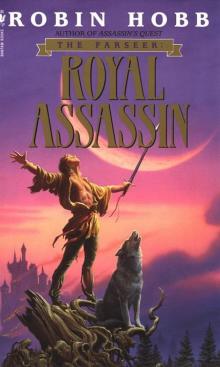 Farseer 2 - Royal Assassin
Farseer 2 - Royal Assassin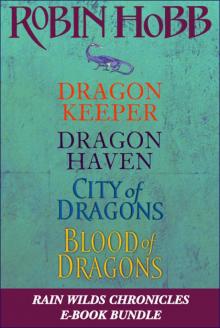 Rain Wilds Chronicles
Rain Wilds Chronicles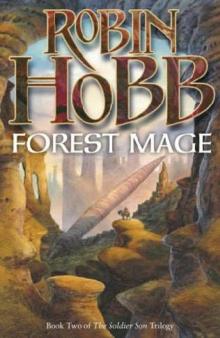 Forest Mage ss-2
Forest Mage ss-2 Ship of Magic lt-1
Ship of Magic lt-1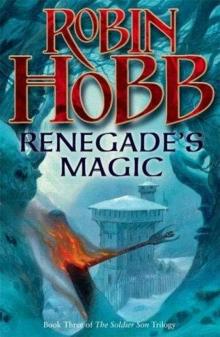 Renegade's Magic ss-3
Renegade's Magic ss-3